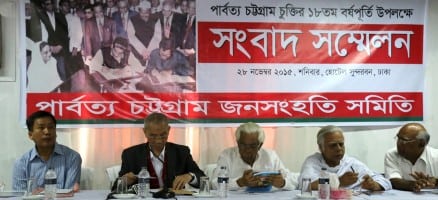Parbatya Chattagram Jana Samhati Samiti (PCJSS) woes to take resort to stiff to stiffer programs, if the government fails to attach importance to the sense of deprivation of the Jumma peoples and their hopes & inspirations. PCJSS also says, if the government continues to use the state machineries and power to suppress the democratic movement of the Jumma peoples instead of taking effective and visible measures for implementation of CHT Accord, no point will be left for the Jumma peoples to return. It reiterates that Jumma peoples are determined and care little for self-sacrifice in defence of their national entities and territories. The government will stay responsible singularly for any undesirable situation that might crop up. The PCJSS expects that the government would demonstrate political wisdom in comprehending rightfully the reality of CHT.
As it is the case with any other nations, the Jumma people do not want to see extinction of their national entity. They do not want to be evicted and driven out from their lands and territory. They want to live as proud citizens of this country with their national identities, fundamental rights and self-dignity while dwelling in their ancestral lands and territories. It is through signing the CHT Accord, the Jumma people have re-asserted their willingness to live in the country as citizens with their own identity and uniqueness. Taking of time in implementing the historic CHT Accord and above all, the ill-venturing by the government as well as the ruling class to carry forward the anti-Jumma-interest conspiracy can never yield anything good.
PCJSS reiterated the warning in a press conference organised on 28 November 2015 at 11:00 am at Hotel Sundarban in Dhaka on the occasion of 18th anniversary of CHT Accord signed between the Government of Bangladesh and PCJSS.
Jyotirindra Bodhipriya Larma, President of PCJSS, read out written statement in the press conference while Mangal Kumar Chakma, Information and Publicity Secretary of PCJSS conducted the event. Besides, Pankaj Bhattacharya, president of Oikya Nap; Syed Abul Maksud, eminent columnist and researcher; Sanjeeb Drong, General Secretary of Bangladesh Indigenous Peoples Forum; Numan Ahmed Khan, Executive Director of IED and Prof. Mesbah Kamal of Dhaka University were present in this press conference.
PCJSS said that the CHT Accord of 1997 signed between the Government of Bangladesh and PCJSS is poised to step into its 18 years of existence since its signing. The Government keeps on claiming that 48 out of 72 provisions of the CHT Accord have been implemented. But as a matter of fact the ground reality bears out that only 25 provisions of the CHT Accord were implemented as of now. While the core issues of the Accord relating to political and constitutional, economic and land rights, withdrawal of all temporary military camps including de facto military rule ‘Operation Uttoron’ and rehabilitation, were left out from being addressed. In consequence, the Special Administrative System embodying the CHT Regional Council and the three Hill District Councils could not be evolved narrowing eventually the scope for mass peoples’ participation in the management of administration as well as the chances for political and peaceful solution to the CHT crisis. The government continues to maintain absolute indifference and is extremely passive as far as the implementation process of the Accord is concerned. In fact, the implementation process of the CHT Accord is totally stalled.
As an instance, land problem can be cited as one of the major aspects of the CHT crisis. The major obstruction in resolving the CHT issues, in accordance with the Accord, lies in the lack of will on the part of the government to bring necessary amendment to the contravening sections of the CHT Land Dispute Resolution Commission Act, 2001. As a way out, a 13-point amendment proposal of CHT Land Dispute Resolution Commission Act, 2001 was adopted in a meeting attended by Dr. Gawher Rizvi, Advisor to the Prime Minister; Chairman of the CHT Regional Council and representatives of PCJSS and the representatives from Ministry of CHT Affairs on 9 January 2015 at the Chittagong Circuit House. The 13-point amendment proposal was also approved by the CHT Accord Implementation Committee in its meeting held on 20 January 2015 at the office of Deputy Leader of Parliament and a high-level inter-ministerial meeting organized by Ministry of CHT Affairs on 28 January 2015 in Rangamati. It was also decided unanimously to place the Amendment Bill of the said Act before the parliament during the Winter Session going on by then. But it is to be noted that even though several sessions of the Parliament including the budget session were held after end of the winter session, the Act, in the amended form, could not be passed till today. Despite having repeated consensus over the issue, the dilly-dallying tactics of the government in bringing amendment to the CHT Land Dispute Resolution Commission Act is a manifestation of its lack of political will and sincerity in resolving the CHT crisis.
Furthermore, it is to be mentioned that as per the decision taken in the meeting held at Prime Minister’s office on 18 February 2015 between the Prime Minister Sheikh Hasina and Chairman of CHT Regional Council who is also the President of PCJSS, the 18-page Report titled: “Statement on the Unimplemented Issues of the CHT Accord” attached with 16 supporting documents as annexure was handed over to the Prime Minister on 1 April 2015. But no progress has been made in this regard to this day.
Following the non-implementation of the CHT Accord, the situation in the CHT, as a whole, has become highly volatile/sensitive. Presently, instead of implementing the CHT Accord, the following anti-Accord and anti-Jumma programs are being implemented?
• Conspiracy to turn the CHT into a Muslim dominated region, instead of preserving its Jumma-inhabited character, has been intensified.
• Military continues to play dominating role, through ‘Operation Uttoran’, in the CHT while the special administrative system embodying the CHT Regional Council and the three Hill District Councils were kept dysfunctional;
• Instead of restituting the alienated lands of the Jumma people, lands belonging to them are being illegally occupied and they are continually being evicted from their ancestral lands and homesteads;
• In the name of development and with the plea to implement the CHT Accord, anti-Jumma-interest programs, such as, establishing University of Science & Technology and Medical College in Rangamati, tourism centers, expansion of reserve forest, setting up of new security camps, giving lands in lease to the outsiders, etc. are being carried out;
• The Accord implementation process is being obstructed by providing covered or overt support to the communal, fundamentalist and ultra-nationalist forces and creating puppet groups among the Jumma peoples;
• The Jumma peoples are under compulsion to lead a life in insecurity and uncertainty due to communal attacks, eviction, killings, rape, killing after rape, abduction, political harassment, persecution, military search and operation, infiltration of outsiders etc.
The CHT crisis is both a national as well as a political problem. In fact, the CHT Accord was signed to resolve the CHT crisis politically and nationally in the interest of the nation. Hence, for the greatest interest of the country and nation, there is no alternative but to fully implement the CHT Accord. Unfortunately, the government has totally stopped doing anything to facilitate the implementation of CHT Accord. Under the circumstances, and for the greater interest of the State, merely expressing solidarity with the movement for the implementation of the CHT Accord is not enough, but it should be joined in by forces that belong to democratic, secular and progressive political parties, organizations and societies, with supportive programs. Therefore, the PCJSS appeals to these forces to build up a movement, at the national level, in support of implementing the CHT Accord. PCJSS also calls upon the present grand alliance government to come forward to ensure speedy, proper and full implementation of the CHT Accord prioritizing the followings:-
1. Declare a time-frame based work plan or roadmap aimed at proper implementation of the CHT Accord immediately;
2. Undertake effective steps to implement the unimplemented issues of the Accord giving priority to devolve all powers and functions on the CHT Regional Council and three Hill District Councils, withdrawal of all temporary camps including ‘Operation Uttoron’ that legitimizes military domination over civil administration, resolution of land disputes by amending the CHT Land Dispute Resolution Commission Act, rehabilitation of Jumma refugees and IDPs, amendment of concerned laws and regulations including CHT Regulation 1900 and Bangladesh Police Act;
3. Undertake legal and administrative steps to preserve the Jumma-inhabited feature of the CHT region;
4. Rehabilitate the Bengali settlers with dignity and honor outside CHT;
5. Stop programs of anti-Accord and anti-Jumma cause immediately;
6. Postpone operation of the Rangamati Science and Technology University and Medical College programs until proper and full implementation of the CHT Accord and undertake measures for the students already admitted in these institutions to merge them in various public universities and medical colleges of the country.
PCJSS press statement in Bangla and English are here.
Parbatya Chattagram Jana Samhati Samiti’s Press Conference
On Implementation of CHT Accord on the occasion of 18th Anniversary of the CHT Accord (English)
Parbatya Chattagram Jana Samhati Samiti’s Press Conference
On Implementation of CHT Accord on the occasion of 18th Anniversary of the CHT Accord (Bangla)


